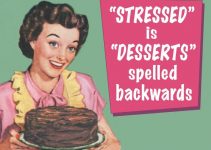
The same can be said of Diet Tips Too …
Most tips aimed at people who have an emotional eating issue make sense, and if applied will correct their eating problems and improve their lives in a bunch of different and exciting ways. The problem though is in being able to apply the suggestions in the first place.
It’s like telling people who are overweight to eat less. That’s good advice and if followed will work and make people happy. But most people won’t, and so the tip isn’t that helpful even if it is a suggestion that is “right”.
That’s an obvious, cut ‘n dry example, but the same issues of application and lack of strategy and basic insight also apply to the following emotional eating tips I came across when I googled the term:
EMOTIONAL EATING TIPS I CAME ACROSS
– Eat only when you’re hungry
Not helpful. Emotional eaters eat whether they are hungry or filled to the brim with food, and telling them this is the same as saying, “just stop doing what you normally do.” Again, not helpful. If we could, we would have already.
– Be good to yourself by taking bubble baths etc..
What these types of tips are meant to communicate is that if you give yourself some nurturing or love in a different format, like a bubble bath or a massage, that you will be satisfying the source of your emotional eating without having to resort to food.
There is value in many types of self care activities but I don’t believe that they actually fill that void and make us feel loved in the way that we all crave and need it. Food doesn’t fill this void either but food’s effect is almost as powerful as a drug’s, and is also a lot less complicated. It’s legal, cheap, won’t send you to the hospital (in the near future) and effortless, just open up a package from the cupboard and eat, while sitting and watching TV.
– Accept your body and realize how truly beautiful you are …
Again, this sounds great and is positive advice, but self acceptance is a long and difficult journey that takes years. You can’t just tell people to love themselves and expect that to magically happen. And, even if the tip to “accept themselves” did imply that this was to be something done in the long term, they don’t specify HOW? Also, in the meantime, what does the reader do about the emotional eating? It’s not a healthy behavior, and is something that is much more powerful in bringing the reader’s self esteem down, than is the suggestion to try to accept one’s body or one’s wish to change (this is very different from hating or feeling shame about one’s body and oneself in general, which is unhealthy and must be addressed).
– Try a stress management technique like yoga, meditation or deep breathing
These are all activities and practices that are good for your mental and physical well being, and so would be very beneficial to cultivate. But after you’re done your hour of yoga, and you feel that familiar urge to eat, then what? Unless you are willing to lock yourself in your basement every evening and breath deeply until bedtime, you will have lots of time on your hands to contend with the beast that are your cravings.
– Ignore your cravings
Kind of infantilizing advice really. If these emotion-based cravings were easy enough to ignore then we already would have. Try telling that to smokers, drinkers, sex addicts, compulsive shoppers and gamblers and see what they have to say about it. Cravings can’t be ignored, they have to be dealt with.
– Distract yourself when bored or when the cravings hit
Fair enough. But with what, and for how long? First of all one has to be able to find something that can work as a distraction to their cravings. Then they have to be able to implement that distraction over a prolonged length of time, consistently. That means they have to have the time and energy to come up with something suitable that works for them with regards to their eating, and their personal interests (meaning it has to be fulfilling or interesting somewhat), then it has to work around their other responsibilities such as family, work and relationship committments.
I’m all for this tip but to just say, “distract yourself,” without giving anyone a decent explanation or a detailed plan on how they can make these kinds of large changes in their daily routine and life in general isn’t helpful.
– Keep junky, hard to resist foods out of your house.
Good advice but the problem is that emotional eaters will simply find the “junkiest” of the healthy foods that remain and eat lots of that. Usually in the form of carbs. Some, who have an irresistible URGE to eat will even go as far as baking something from scratch to get their fix. Don’t discount the lengths emotional eaters will go to get what they want … they will learn a new skill, knock over any obstacle in their way and even drive 20 miles or more, outside of town to find that one pizza joint that’s open 24/7.
I don’t think the person who gave out that piece of advice knew what kind of people she was dealing with 🙂
– Call a friend to make you feel better
Here again, unless that friend has a clear schedule with 4 hours of available time every single night then it won’t do much. Most emotional eaters eat every single day, and don’t have 28 hours of phone support available to them each week.
– Dance, squeeze a stress ball or go for a walk
Following this advice will make you an expert in dance within 6 months, give you a grip strength that rivals a brick layer’s, and have you spending most of your free time outside your home, as you walk and wander the streets for hours, looking like someone who’s lost their marbles and has gone off the deep end while the neighbors look on puzzled.
– Eat slowly and savor your food completely
Emotional eaters can do this. They will eat a healthy dinner and love every bite. Then they will do the same with dessert, 2nd dessert and their midnight snack.
– Stay in the present moment
Seriously? Staying in the moment is the prescriptive cure for almost everything these days, except for curing cancer which I’m sure somebody will blog about soon. In any case, emotional eaters have the ability to eat in the past, present and future, so restricting eating to any one time period is ineffective.
– Manage your anxiety
Sure, people spend a good decade or more trying to do just this through therapy and introspection, but because someone wrote down that we should, “manage our stress and anxiety,” we simply will. Problem solved.
– Throw away the bathroom scale
Sure thing. Now we can overeat AND not be able to measure how bad it’s effecting us. In all seriousness, the idea of using the scale sparingly is actually good, but throwing it away takes away one tool we have to measure our progress or lack of.
Results of Following the Most Common Internet Tips on Emotional Eating
If the above advice was followed, one would be able to look out their window and see an army of people frantically taking brisk walks after dinner to try to distract themselves from the one thing on their minds; food. Also, if the said advice was followed, I’d advise everyone to buy stocks in companies that manufacture bubble bath products. You’d get rich AND free aromatherapy sessions daily, as everyone at work would smell like lavender. (*** For some reason taking bubble baths is one of the most common recommendations for stress management, and for any ailment to do with mental or physical health … it comes right after, “Sign up for our newsletter” to get the REAL, ACTUAL information that will truly heal you for once and for all.)
What Works
1- Getting to the root of the problem does, which means of course emotional processing, regulation and growth. The problem is that it takes a very long time and lots of hard work. So while doing this work is the right path to walk down, and should be started immediately, it doesn’t do much good in the short term.
2- Short Term management – If you can come from an honest place and admit that you’re likely not going to stop overeating, then you will need to find a way to manage the behavior and optimize it. Meaning to first stop the problem from getting worse AND then seeing what you can do to make it better that DOESN’T involve stopping your emotional eating.
The best way to do that is as follows:
1- Read up on the management section of the guide.
2- Read the blog articles that have topics related to management and management tips.
3 – See if there are any useful ideas, that you feel are helpful from the readers via the reader’s tips section.
Once you feel you have the management aspect under control, it’s time to tackle the emotional one.
The best way to do that is as follows:
1- Read the guide to get a more in depth understanding of emotional eating.
2- Read the blog articles on emotional growth.
3- Read the recommended books on the book list. They are some of the most helpful I’ve come across that actually have meat on their bones, meaning something solid to offer the reader.
This second part, the emotional growth is a ton of work and takes a long time. Slow and steady wins the race though and the effort is well worth it.
The benefits of doing this work to you go way beyond emotional eating.

THE EATING LOVE GUIDE (FREE)
The Eating Love Guide has helped many people regain control of their eating patterns, resulting not only in weight loss but also better health and improved self-esteem. To read it online, click here.

SUBMIT A POST!
To post your cheat meal, click here. To share your tips, wisdom and/or emotional journey, click here.


